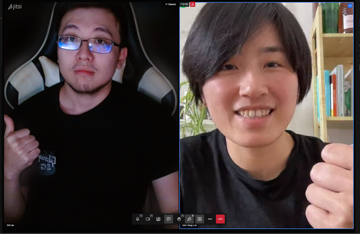#vtaiwan
2024-03-01
Peter
12:05:04
歐耶
2024-03-05
Darkness Hanson
11:15:52
@dark3hand has joined the channel
Peter
23:06:35
大家晚安,明天有小聚,共筆我還在製作中,歡迎大家上線!
2024-03-06
ichieh
02:58:25
@chiehg0v has left the channel
Peter
15:48:46
HackMD
# 0306小松 時間:19:00-21:00 地點:線上 參與者: 線上參與連結 / Link:<https://meet.jit.si/vTaiwan> ## 活動或可以投入的事情 - 本週收到
 1
1- 😆1
Peter
15:48:46
Peter
18:53:23
大家晚安,等等見!
Peter
18:53:23
大家晚安,等等見!
Peter
20:35:24
嗨嗨大家,想跟大家分享一個消息,那就是之前參與 OpenAI 的活動之後,還有64萬左右的社群經費,放在 OCF 的帳戶中。由於這是 vTaiwan 社群第一次擁有自己的社群經費,所以目前社群其實是沒有動用社群經費相關的流程規劃的。社群經費的資訊可以參考今天的小松共筆。
而近期,英國的 Mysociety 希望邀請 vTaiwan 社群出席六月的 TicTec 研討會,因此會有是否要動用社群經費來補助機票等事宜。目前我有在爭取外部的補助,希望可以在不動用社群經費的情況下補助台灣的參與者出席。
不過在最壞的情況下,可能還是要有動用社群經費的情形。也因此就動用社群經費的部分,我們在今天(3/6)的小聚討論後,認為應該要讓大家參與討論,也因此希望大家可以討論看看如果要運用的話,流程應該要如何進行,以及相關紀錄與追蹤如何落實。同時,我們也預定在4/10的小聚進行線上討論,同時完成相關程序的制定。
如果有任何問題,也都歡迎跟我說!
而近期,英國的 Mysociety 希望邀請 vTaiwan 社群出席六月的 TicTec 研討會,因此會有是否要動用社群經費來補助機票等事宜。目前我有在爭取外部的補助,希望可以在不動用社群經費的情況下補助台灣的參與者出席。
不過在最壞的情況下,可能還是要有動用社群經費的情形。也因此就動用社群經費的部分,我們在今天(3/6)的小聚討論後,認為應該要讓大家參與討論,也因此希望大家可以討論看看如果要運用的話,流程應該要如何進行,以及相關紀錄與追蹤如何落實。同時,我們也預定在4/10的小聚進行線上討論,同時完成相關程序的制定。
如果有任何問題,也都歡迎跟我說!
HackMD
# 0306小松 時間:19:00-21:00 地點:線上 參與者:Crystal, eli, peter, josh 線上參與連結 / Link:<https://meet.jit.si/vTaiw>
 1
1 1
1 1
1
Peter
20:35:24
嗨嗨大家,想跟大家分享一個消息,那就是之前參與 OpenAI 的活動之後,還有64萬左右的社群經費,放在 OCF 的帳戶中。由於這是 vTaiwan 社群第一次擁有自己的社群經費,所以目前社群其實是沒有動用社群經費相關的流程規劃的。社群經費的資訊可以參考今天的小松共筆。
而近期,英國的 Mysociety 希望邀請 vTaiwan 社群出席六月的 TicTec 研討會,因此會有是否要動用社群經費來補助機票等事宜。目前我有在爭取外部的補助,希望可以在不動用社群經費的情況下補助台灣的參與者出席。
不過在最壞的情況下,可能還是要有動用社群經費的情形。也因此就動用社群經費的部分,我們在今天(3/6)的小聚討論後,認為應該要讓大家參與討論,也因此希望大家可以討論看看如果要運用的話,流程應該要如何進行,以及相關紀錄與追蹤如何落實。同時,我們也預定在4/10的小聚進行線上討論,同時完成相關程序的制定。
如果有任何問題,也都歡迎跟我說!
而近期,英國的 Mysociety 希望邀請 vTaiwan 社群出席六月的 TicTec 研討會,因此會有是否要動用社群經費來補助機票等事宜。目前我有在爭取外部的補助,希望可以在不動用社群經費的情況下補助台灣的參與者出席。
不過在最壞的情況下,可能還是要有動用社群經費的情形。也因此就動用社群經費的部分,我們在今天(3/6)的小聚討論後,認為應該要讓大家參與討論,也因此希望大家可以討論看看如果要運用的話,流程應該要如何進行,以及相關紀錄與追蹤如何落實。同時,我們也預定在4/10的小聚進行線上討論,同時完成相關程序的制定。
如果有任何問題,也都歡迎跟我說!
Peter
20:43:13
另外,vTaiwan 的串串開張!https://www.threads.net/@vtaiwan.tw
Peter
20:43:13
另外,vTaiwan 的串串開張!https://www.threads.net/@vtaiwan.tw
Threads
法律規定社會上每個人的權利與義務,因此法規應該具備哪些內容,不只是行政立法部門的工作,而與每個人都切身相關。 越多利益關係人加入討論,就能夠讓法規的內容越完整周延,避免出現權益受到影響、但意見又無法表達的矛盾狀況。參與 vTaiwan,不只能夠照顧到自己的權益,同時也是在幫助每一個可能的利益關係人。 3 Followers.
 1
1- ❤️1
- 🎉1
 1
1
Peter
20:54:40
今天感謝 @joshuacyyang @apokoios@tomy7912348 上線!
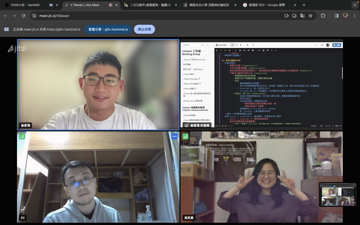
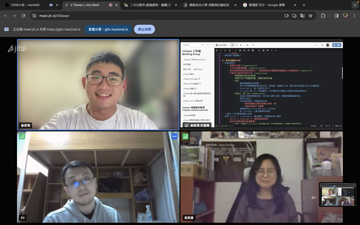
2024-03-08
Peter
21:35:42
剛剛有先簡單寫了一個提案,如以下附件,雖然有點趕,不過如果大家覺得沒問題,我就會送出。
chewei
我問了國發會資管處窗口
今天都可收件,不是下班前
台灣時間 3/8 晚上 23:59 之前
下一階段開放政府國家行動方案提案表格
https://join.gov.tw/policies/detail/cbba96d5-537e-4e3e-a18a-5ddc61fa8bfc
- Forwarded from #ogp
- 2024-03-08 13:47:35
Peter
21:35:42
剛剛有先簡單寫了一個提案,如以下附件,雖然有點趕,不過如果大家覺得沒問題,我就會送出。
chewei
我問了國發會資管處窗口
今天都可收件,不是下班前
台灣時間 3/8 晚上 23:59 之前
下一階段開放政府國家行動方案提案表格
https://join.gov.tw/policies/detail/cbba96d5-537e-4e3e-a18a-5ddc61fa8bfc
- Forwarded from #ogp
- 2024-03-08 13:47:35
Peter
23:10:49
另外,我剛剛也投稿了g0v summit! https://summit2024.g0v.tw/prj/Pgcm4d53zOMYPGWa5lbABH6oKN3616
- 🙌1
Peter
23:10:49
另外,我剛剛也投稿了g0v summit! https://summit2024.g0v.tw/prj/Pgcm4d53zOMYPGWa5lbABH6oKN3616
2024-03-09
Naoki Sakata
12:27:20
@naoki.sakata has joined the channel
2024-03-11
HT Iunn
17:53:12
@jedy2468 has joined the channel
2024-03-12
tzu-sheng kuo
03:47:42
Glen Weyl 在 Stanford 的演講提到 vTaiwan:
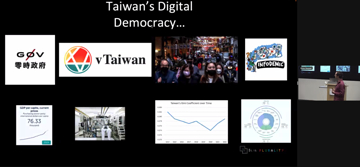
- 👍2
- 🎉1
Peter
18:30:56
明天一樣有小聚喔!歡迎大家上線!
Peter
18:30:56
明天一樣有小聚喔!歡迎大家上線!
Peter
18:31:06
共筆製作中,敬請期待!
Peter
18:31:06
共筆製作中,敬請期待!
Josh
23:32:36
各位,那個Plurality的書要出版了,這週要截止,意外發現他們的寫手是這樣寫vTaiwan的,大家覺得我們要幫忙修改嗎?
“While these (attempts of vTaiwan) were generally viewed as successful by all parties, the intensive effort required, the lack of mandates for government to respond and the somewhat narrow scope has led to a relative decline of the platform recently.”
https://github.com/pluralitybook/plurality/blob/main/contents/english/02-02-the-life-of-a-digital-democracy.md
“While these (attempts of vTaiwan) were generally viewed as successful by all parties, the intensive effort required, the lack of mandates for government to respond and the somewhat narrow scope has led to a relative decline of the platform recently.”
https://github.com/pluralitybook/plurality/blob/main/contents/english/02-02-the-life-of-a-digital-democracy.md
Josh
23:32:36
各位,那個Plurality的書要出版了,這週要截止,意外發現他們的寫手是這樣寫vTaiwan的,大家覺得我們要幫忙修改嗎?
“While these (attempts of vTaiwan) were generally viewed as successful by all parties, the intensive effort required, the lack of mandates for government to respond and the somewhat narrow scope has led to a relative decline of the platform recently.”
https://github.com/pluralitybook/plurality/blob/main/contents/english/02-02-the-life-of-a-digital-democracy.md
“While these (attempts of vTaiwan) were generally viewed as successful by all parties, the intensive effort required, the lack of mandates for government to respond and the somewhat narrow scope has led to a relative decline of the platform recently.”
https://github.com/pluralitybook/plurality/blob/main/contents/english/02-02-the-life-of-a-digital-democracy.md
*The Life of a Digital Democracy* > When we see "internet of things," let's make it an *internet of beings*. > When we see "virtual reality," let's make it a *shared reality*. > When we see "machine learning," let's make it *collaborative learning*. > When we see "user experience," let's make it *about human experience*. > When we hear “the singularity is near” — let us remember: The *Plurality* is here. Without living in Taiwan and experiencing it regularly, it is hard to grasp what such an achievement means, and for those living their continuously many of these features are taken for granted. Thus we aim here to provide concrete illustrations and quantitative analyses of what distinguishes Taiwan's digital civic infrastructure from those of most of the rest of the world. Because there are far too many examples to discuss in detail, we have selected six diverse illustrations that roughly cover a primary focal project for each two year period since 2012; after we briefly list a wide range of other programs. *g0v* More than any other institution, g0v (pronounced gov-zero) symbolizes the civil-society foundation of digital democracy in Taiwan. Founded in 2012 by civic hackers including Kao Chia-liang, g0v arose from discontent with the quality of government digital services and data transparency<https://github.com/pluralitybook/plurality/blob/main/contents/english/02-02-the-life-of-a-digital-democracy.md#user-content-fn-g0vManifesto-c42724d91a763704f68c85a4c288a10c|1>. Civic hackers began to scrape government websites (usually with the suffix <http://gov.tw|gov.tw>) and build alternative formats for data display and interaction for the same website, hosting them at <http://g0v.tw|g0v.tw>. These "forked" versions of government websites often ended up being more popular, leading some government ministers, like Simon Chang to begin "merging" these designs back into government services. <https://raw.githubusercontent.com/pluralitybook/plurality/main/figs/g0v-venn.png|g0v-venn> g0v built on this success to establish a vibrant community of civic hackers interacting with a range of non-technical civil society groups at regular hackathon, called "jothons" (based on a Mandarin play on words, meaning roughly "join-athon"). While hackathons are common in many parts of the world, some of the unique features of g0v practices include the diversity of participant (usually a majority non-technical and with nearly full gender parity), the orientation towards civic problems rather than commercial outcomes and the close collaboration with a range of civic organizations. These features are perhaps best summarized by the slogan "Ask not why nobody is doing this. You are the 'nobody'!", which has led the group to be labeled the "nobody movement". They are also reflected in a venn diagram commonly used to explain the movement's intentions shown above. As we will note below, a majority of the initiatives we highlight grew out of g0v and closely aligned projects. *Sunflower* While g0v gained significant public attention and support even in its earliest years, it burst most prominently onto the public scene during the Sunflower Movement we described above. Hundreds of contributors in the g0v community were present during the occupation of the Legislative Yuan (LY), aiding in broadcasting, documenting and communicating civic actions. Livestream-based communication sparked heated discussion among the public. Street vendors, lawyers, teachers, and designers rolled up their sleeves to participate in various online and offline actions. Digital tools brought together resources for crowdfunding, rallies, and international voices of support. On March 30, 2014, half a million people took to the streets in the largest demonstration in Taiwan since the 1980s. Their demands, thus formulated, for a review process prior to the passage of the Cross-Straits Services Trade Agreement was accepted by LY Speaker Wang Jin-pyng on April 6, about three weeks after the start of the occupation, leading to its dispersal soon thereafter. The contributions of g0v to both sides and the resolution of their tensions led the sitting government to see the merit in g0v's methods and in particular cabinet member Jaclyn Tsai recruited one of us as a youth "reverse mentor" and began to attend and support g0v meetings, putting an increasing range of government materials into the public domain through g0v platforms. Many Sunflower participants devoted themselves to the open government movement; the following local (2014) and general (2016) elections saw a dramatic swing in outcomes of roughly 10 percentage points towards the Green camp, as well as the establishment of a new political party by the Sunflower leaders, the New Power Party, including leading Taiwanese rock star Freddy Lim. Together, these events significantly added to the momentum behind g0v and led to one of our appointment as Minister without Portfolio responsible for open government, social innovation and youth participation. *vTaiwan and Join* During this process of institutionalization of g0v, there was growing demand to apply the methods that had allowed for these dispute resolutions to a broader range of policy issues. This led to the establishment of vTaiwan, a platform and project developed by g0v for facilitating deliberation on public policy controversies. The process involved many steps (proposal, opinion expression, reflection and legisation) each harnessing a range of open source software tools, but has become best known for its use of the at-the-time(2015)-novel machine learning based open-source "wikisurvey"/social media tool Polis, which we discuss further in our chapter on 05-04 Augmented Deliberation below. In short, Polis works much like a conventional microblogging service like Twitter/X except that rather than displaying content that maximizes engagement it shows the clusters of opinion that exist and highlights statements that bridge them to faciliate both consensus formation and the better understanding of lines of division. <https://raw.githubusercontent.com/pluralitybook/plurality/main/figs/vtaiwan-polis.png|vtaiwan-polis> vTaiwan was deliberately intended as an experimental, high-touch, intensive platform for committed participants. It had about 200,000 users or about 1% of Taiwan's population at its peak and held detailed deliberations on 28 issues, 80% of which led to legislative action. These focused mostly on questions around technology regulation, such as the regulation of ride sharing, responses to non-consensual intimate images, regulatory experimentation with financial technology and regulation of AI. While these were generally viewed as successful by all parties, the intensive effort required, the lack of mandates for government to respond and the somewhat narrow scope has led to a relative decline of the platform recently. The Public Digital Innovation Space (PDIS) that one of us established in 2016 to work with vTaiwan and other projects we discuss below in the ministerial role therefore supported a second, related platform Join. While Join also sometime used Polis, it has a lighter-weight user interface and focuses primarily on soliciting input, suggestions and initatives from a broader public, and has an enforcement mechanism where government officials must respond if a proposal receives sufficient support. Unlike vTaiwan, furthermore, Join addresses a range of policy issues, including controversial non-technological issues such as high school's start time, and has strong continuing usage today of roughly half of the population over its lifetime and an average of 11,000 unique daily visitors. *Hackathons, coalitions and quadratic signals* While such levels of digital civic engagement may seem surprising to many Westerners, they can be seen simply as the harnessing of a small portion of the energy typically wasted on conflict on (anti-)social media towards solving public problems. Even more co…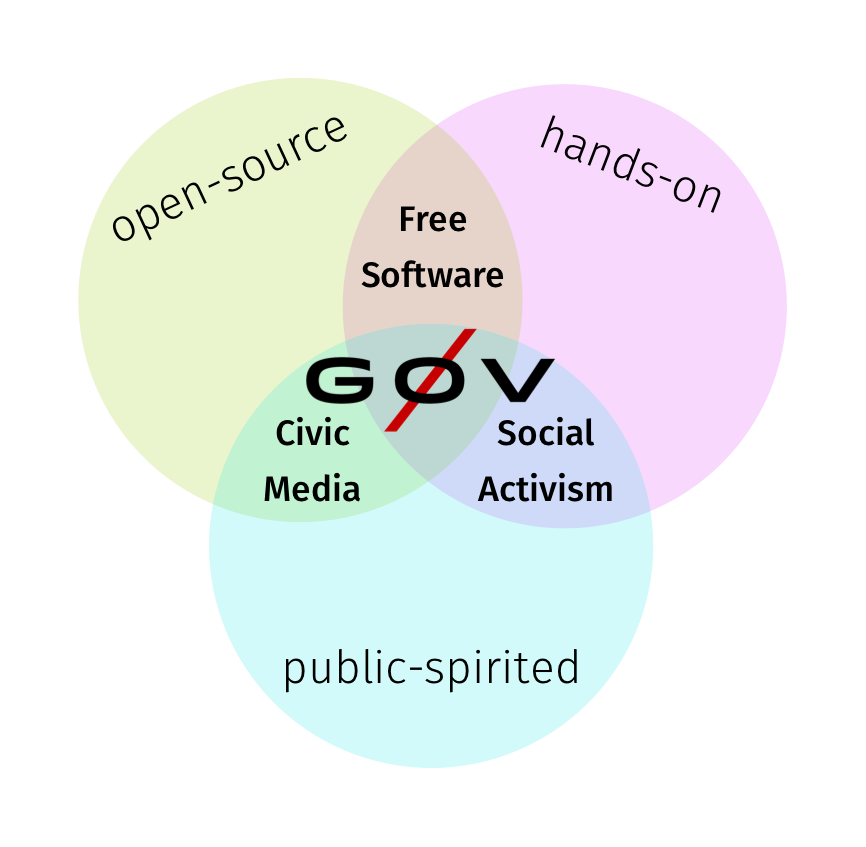
Josh
23:34:18
中文版
“雖然各方普遍認為這些措施是成功的,但由於需要大量投注精力、政府回應授權層級與範圍較窄,導致該平臺最近活躍程度不如以往。“”
https://github.com/pluralitybook/plurality/commit/67384c0e17a16f35eafc9ce86ebf8f577385127a#diff-c9e4b12c2a79b5951c8ca7[…]4a3f666068edafd30877b67ada0
“雖然各方普遍認為這些措施是成功的,但由於需要大量投注精力、政府回應授權層級與範圍較窄,導致該平臺最近活躍程度不如以往。“”
https://github.com/pluralitybook/plurality/commit/67384c0e17a16f35eafc9ce86ebf8f577385127a#diff-c9e4b12c2a79b5951c8ca7[…]4a3f666068edafd30877b67ada0
Peter
2024-03-12 23:37:00
明天可以來討論?
Peter
2024-03-12 23:42:19
感謝提供討論的內容xd
tzu-sheng kuo
2024-03-12 23:43:20
我覺得可以借用 Glen Weyl 在他的演講裡提到的說法:vTaiwan 成功從一個體制外的平台演變成體制內的 Join 平台,確保政府回應的強制性,至今 Join 平台也很活躍,然而 vTaiwan 本身的定位也因此較不明確,正在探索轉型的可能性
Peter
2024-03-12 23:44:38
支持
mrorz
2024-03-13 13:42:51
join 跟 vtaiwan 之間有「演變」關係嗎 🤔
tzu-sheng kuo
2024-03-13 13:54:28
好問題!我其實不清楚,只是聽到 Glen 在演講裡提到「… vTaiwan, later Join …」
實際情況可能要資深參與者比較清楚(cc @sylin )
實際情況可能要資深參與者比較清楚(cc @sylin )
Peter
2024-03-13 13:55:26
就我的印象,這兩個似乎是同時間進行的,我支持的部分會是將 glen weyl 的論述修正後提建議
mrorz
2024-03-13 16:34:01
我印象中也是幾乎同時進行,vTaiwan 的方法論幾乎是為了虛擬法規調適量身打造(假設虛擬法規會規範到的人,在數位議題上會希望參與更多審議過程等等),Join 的設計基本上就是國外早就有的 petition website 如 We the People
mrorz
2024-03-13 16:35:00
(咦,原來 We the people 被川普關掉了嗎⋯⋯)
https://en.wikipedia.org/wiki/We_the_People_(petitioning_system)
https://en.wikipedia.org/wiki/We_the_People_(petitioning_system)
Josh
23:34:18
中文版
“雖然各方普遍認為這些措施是成功的,但由於需要大量投注精力、政府回應授權層級與範圍較窄,導致該平臺最近活躍程度不如以往。“”
https://github.com/pluralitybook/plurality/commit/67384c0e17a16f35eafc9ce86ebf8f577385127a#diff-c9e4b12c2a79b5951c8ca7[…]4a3f666068edafd30877b67ada0
“雖然各方普遍認為這些措施是成功的,但由於需要大量投注精力、政府回應授權層級與範圍較窄,導致該平臺最近活躍程度不如以往。“”
https://github.com/pluralitybook/plurality/commit/67384c0e17a16f35eafc9ce86ebf8f577385127a#diff-c9e4b12c2a79b5951c8ca7[…]4a3f666068edafd30877b67ada0
Peter
2024-03-12 23:37:00
明天可以來討論?
Peter
2024-03-12 23:42:19
感謝提供討論的內容xd
tzu-sheng kuo
2024-03-12 23:43:20
我覺得可以借用 Glen Weyl 在他的演講裡提到的說法:vTaiwan 成功從一個體制外的平台演變成體制內的 Join 平台,確保政府回應的強制性,至今 Join 平台也很活躍,然而 vTaiwan 本身的定位也因此較不明確,正在探索轉型的可能性
Peter
2024-03-12 23:44:38
支持
mrorz
2024-03-13 13:42:51
join 跟 vtaiwan 之間有「演變」關係嗎 🤔
tzu-sheng kuo
2024-03-13 13:54:28
好問題!我其實不清楚,只是聽到 Glen 在演講裡提到「… vTaiwan, later Join …」
實際情況可能要資深參與者比較清楚(cc @sylin )
實際情況可能要資深參與者比較清楚(cc @sylin )
Peter
2024-03-13 13:55:26
就我的印象,這兩個似乎是同時間進行的,我支持的部分會是將 glen weyl 的論述修正後提建議
mrorz
2024-03-13 16:34:01
我印象中也是幾乎同時進行,vTaiwan 的方法論幾乎是為了虛擬法規調適量身打造(假設虛擬法規會規範到的人,在數位議題上會希望參與更多審議過程等等),Join 的設計基本上就是國外早就有的 petition website 如 We the People
mrorz
2024-03-13 16:35:00
(咦,原來 We the people 被川普關掉了嗎⋯⋯)
https://en.wikipedia.org/wiki/We_the_People_(petitioning_system)
https://en.wikipedia.org/wiki/We_the_People_(petitioning_system)
Peter
23:37:00
明天可以來討論?
Peter
23:42:19
感謝提供討論的內容xd
tzu-sheng kuo
23:43:20
我覺得可以借用 Glen Weyl 在他的演講裡提到的說法:vTaiwan 成功從一個體制外的平台演變成體制內的 Join 平台,確保政府回應的強制性,至今 Join 平台也很活躍,然而 vTaiwan 本身的定位也因此較不明確,正在探索轉型的可能性
Peter
23:44:38
支持
2024-03-13
mrorz
13:42:51
join 跟 vtaiwan 之間有「演變」關係嗎 🤔
tzu-sheng kuo
13:54:28
好問題!我其實不清楚,只是聽到 Glen 在演講裡提到「… vTaiwan, later Join …」
實際情況可能要資深參與者比較清楚(cc @sylin )
實際情況可能要資深參與者比較清楚(cc @sylin )
Peter
13:55:26
就我的印象,這兩個似乎是同時間進行的,我支持的部分會是將 glen weyl 的論述修正後提建議
mrorz
16:34:01
我印象中也是幾乎同時進行,vTaiwan 的方法論幾乎是為了虛擬法規調適量身打造(假設虛擬法規會規範到的人,在數位議題上會希望參與更多審議過程等等),Join 的設計基本上就是國外早就有的 petition website 如 We the People
mrorz
16:35:00
(咦,原來 We the people 被川普關掉了嗎⋯⋯)
https://en.wikipedia.org/wiki/We_the_People_(petitioning_system)
https://en.wikipedia.org/wiki/We_the_People_(petitioning_system)
Peter
18:42:13
HackMD
vTaiwan 工作組 Working Group === - [vTaiwan工作組 General Info](/f9c4pS_TQjClh0g6wCJ8iw) - [新手簡報](https:
Peter
18:42:27
今天共筆製作中!等等歡迎大家上線討論!
Peter
18:42:27
今天共筆製作中!等等歡迎大家上線討論!
Peter
19:08:17
@tomy7912348 @tzushenk @sylin 今天會上線嗎~
Peter
19:08:17
@tomy7912348 @tzushenk @sylin 今天會上線嗎~
shuyang
22:35:23
Hihi 我下次會上線 幫忙投稿 TiCTec
shuyang
22:35:23
Hihi 我下次會上線 幫忙投稿 TiCTec
shuyang
22:35:38
deadline 應該還是 3/22?
shuyang
22:35:38
deadline 應該還是 3/22?
Peter
22:56:11
對,應該是
Peter
22:56:11
對,應該是
shuyang
23:45:05
你們跟西敏寺的 funding 可以在 3/22之前確認嗎?如果順利拿到就不用報兩場。專心做工作坊就好。
shuyang
23:45:05
你們跟西敏寺的 funding 可以在 3/22之前確認嗎?
Peter
23:47:12
還是確定的話一場我也可以報,如果確定的話shu這邊的負擔可以少一些!
Peter
23:47:12
還是確定的話一場我也可以報,如果確定的話shu這邊的負擔可以少一些!
2024-03-19
Peter
02:21:55
雖然有點遲到,但想跟大家分享,vTaiwan 當初的出現,就是318學運帶來的契機喔
2024-03-20
shuyang
19:06:43
https://meet.jit.si/vTaiwan - Peter 似乎是出國比賽了~我會弄一下 TicTec application
Josh
19:54:42
上週討論,好像這三週就只有這週沒有找到主持人 😅
Eli
20:02:40
我也在線上
Peter
22:45:40
感謝兩位!
Peter
22:45:40
感謝兩位!
shuyang
23:03:56
今天有開共筆
今日進度:已經投稿 TicTec 20 min presentation
小提醒⏰ 如果要投工作坊的話,截止日期應該也是3/22喲
今日進度:已經投稿 TicTec 20 min presentation
小提醒⏰ 如果要投工作坊的話,截止日期應該也是3/22喲
shuyang
23:03:56
今天有開共筆
今日進度:我已經投稿 TicTec 20 min presentation
小提醒⏰ 如果Peter Josh要投工作坊的話,截止日期應該也是3/22喲
今日進度:我已經投稿 TicTec 20 min presentation
小提醒⏰ 如果Peter Josh要投工作坊的話,截止日期應該也是3/22喲
2024-03-21
Peter
01:14:08
好,我會先上傳!
Peter
01:14:08
好,我會先上傳!
2024-03-27
Eli
13:40:15
https://g0v.hackmd.io/@kg9TVnPtS-S8PZrw1rIvPg/BytA0Yek0
我晚上小松會上線,@sylin 有什麼需要討論的嗎
我晚上小松會上線,@sylin 有什麼需要討論的嗎
HackMD
# 20240327小松 時間:19:00-21:00 地點:線上 參與者:ELi 線上參與連結 / Link:<https://meet.jit.si/vTaiwan>
- 👍1
- 1
Eli
13:40:15
https://g0v.hackmd.io/@kg9TVnPtS-S8PZrw1rIvPg/BytA0Yek0
我晚上小松會上線,@sylin 有什麼需要討論的嗎
我晚上小松會上線,@sylin 有什麼需要討論的嗎
2024-03-29
Peter
04:13:17
4/1 才開始索票~歡迎廣傳!
tzu-sheng kuo
06:40:26
Madeleine Daepp 之前來台灣的報導出來了(可惜有 paywall):https://www.economist.com/by-invitation/2024/03/26/video-will-kill-the-truth-if-monitoring-doesnt-improve-argue-two-researchers
2024-03-30
2024-03-31
luyunqiao2008.2.16
20:04:54
@luyunqiao2008.2.16 has left the channel
